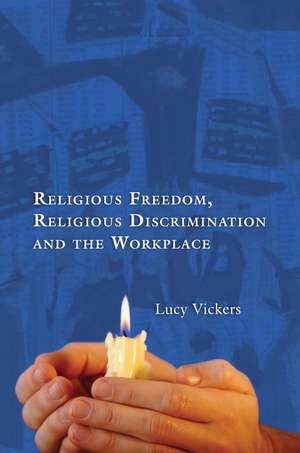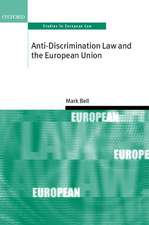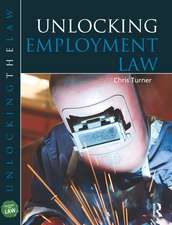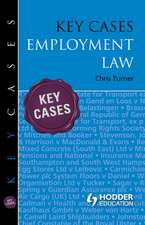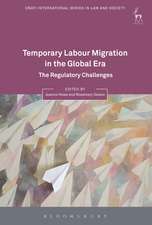Religious Freedom, Religious Discrimination and the Workplace
Autor Lucy Vickersen Limba Engleză Paperback – 14 dec 2009
| Toate formatele și edițiile | Preț | Express |
|---|---|---|
| Paperback (2) | 346.61 lei 3-5 săpt. | |
| Bloomsbury Publishing – 2 noi 2016 | 346.61 lei 3-5 săpt. | |
| Bloomsbury Publishing – 14 dec 2009 | 465.91 lei 6-8 săpt. |
Preț: 465.91 lei
Preț vechi: 645.35 lei
-28% Nou
Puncte Express: 699
Preț estimativ în valută:
89.15€ • 93.33$ • 73.77£
89.15€ • 93.33$ • 73.77£
Carte tipărită la comandă
Livrare economică 05-19 aprilie
Preluare comenzi: 021 569.72.76
Specificații
ISBN-13: 9781841136875
ISBN-10: 1841136875
Pagini: 244
Dimensiuni: 156 x 234 x 12 mm
Greutate: 0.41 kg
Editura: Bloomsbury Publishing
Colecția Hart Publishing
Locul publicării:London, United Kingdom
ISBN-10: 1841136875
Pagini: 244
Dimensiuni: 156 x 234 x 12 mm
Greutate: 0.41 kg
Editura: Bloomsbury Publishing
Colecția Hart Publishing
Locul publicării:London, United Kingdom
Notă biografică
Lucy Vickers is a Professor of Law and Director of the Centre for Legal Research and Policy Studies at Oxford Brookes University.
Cuprins
Chapter 1: Religious Discrimination and Religious Freedom at Work I Introduction II Religion in the UK III Experience of Discrimination IV Tackling Religious Discrimination Chapter 2: Seeking a Definition of Religion and Belief I What is 'Religion'? II Defining Belief III Towards a Definition of Religion and Belief Chapter 3: Protecting Religion at Work I Introduction II Why Protect Religious Interests? III Protecting Religious Interests in the Work Context IV The Proportionality Equation: Religion and the Workplace V Conclusion Chapter 4: Freedom of Religion at Work and the European Convention on Human Rights I Freedom of Religion and the Human Rights Act 1998 II Protection of Freedom of Religion Under the ECHR III Freedom of Religion Under Article 9 IV Protection Against Religious Discrimination Under Article 14 V Conclusion 116Chapter 5: Protection Against Religious Discrimination in the UK I Protection Under the Employment Equality (Religion and Belief) Regulations 2003 II Religious Schools III Protection of Religious Interests Which are Not Protected by the Regulations IV Conclusion Chapter 6: Religious Interests in the Workplace: Comparative Perspectives I United States of America II Canada III Europe IV Conclusion Chapter 7: Religious Freedom at Work I A Duty of Reasonable Accommodation? II Protecting Religious Work III Remaining Difficulties IV Conclusion
Recenzii
.a thoughtful and comprehensive book which will be of value to all of us.who teach and work in the field of employment law.
The book looks at such issues as the nature of religious freedom, discrimination based on religious interests, the extent to which such interests deserve protection at the workplace, and the guidance offered by international instruments such as the European Convention on Human Rights. Although the work is UK-centred, there are some comparative perspectives included, notably from the United States, Canada and the rest of Europe.
...scholarly, informative, interesting, and thought-provoking...Vickers has written a highly informative book that provides great detail about the subject. She offers the reader nuanced and dense discussions of the issues, and while some readers may find the legal arguments and explanations complex, the informed reader with an interest in the subject will welcome the elucidation and clarification of many fine points...an informative and welcome addition to the literature on this important subject.
This work is a comprehensive overview of the topic with some extremely useful material, particularly in the early chapters. The author's style is concise and accessible, which will render this book useful to academics, students and practitioners both within and without the law, although they may wish to read it alongside a more recent discussion of the relevant case law.
...a thoughtful and wide-ranging survey, enhanced by a useful section on comparison with other jurisdictions...It is not possible within the confi nes of a book review to do justice to the rich and fascinating range of arguments propounded in this work.
The book looks at such issues as the nature of religious freedom, discrimination based on religious interests, the extent to which such interests deserve protection at the workplace, and the guidance offered by international instruments such as the European Convention on Human Rights. Although the work is UK-centred, there are some comparative perspectives included, notably from the United States, Canada and the rest of Europe.
...scholarly, informative, interesting, and thought-provoking...Vickers has written a highly informative book that provides great detail about the subject. She offers the reader nuanced and dense discussions of the issues, and while some readers may find the legal arguments and explanations complex, the informed reader with an interest in the subject will welcome the elucidation and clarification of many fine points...an informative and welcome addition to the literature on this important subject.
This work is a comprehensive overview of the topic with some extremely useful material, particularly in the early chapters. The author's style is concise and accessible, which will render this book useful to academics, students and practitioners both within and without the law, although they may wish to read it alongside a more recent discussion of the relevant case law.
...a thoughtful and wide-ranging survey, enhanced by a useful section on comparison with other jurisdictions...It is not possible within the confi nes of a book review to do justice to the rich and fascinating range of arguments propounded in this work.
Descriere
Considers the protection of religious interests in the workplace and establishes a basis for determining the scope of religious freedom at work.
Caracteristici
In this book the author considers the extent to which religious interests are protected at work, with particular reference to the protection against religious discrimination provided by the Equality Act 2010.
